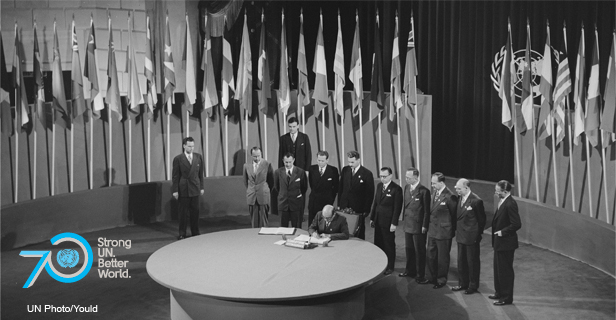
"The 70th anniversary of the United Nations is an opportunity to reflect - to look back on the UN's history and take stock of its enduring achievements. It is also an opportunity to spotlight where the UN - and the international community as a whole - needs to redouble its efforts to meet current and future challenges across the three pillars of its work: peace and security, development, and human rights."
UN Secretary-General Ban Ki-moon
The United Nations was founded 70 years ago in the aftermath of the Second World War, a war that was the deadliest war in military history and that killed more than 60 million people worldwide. In 1945, many nations were in ruins and people were suffering unprecedented hardship. In an effort to achieve world peace as well as prosperity and to prevent potential disputes from escalating into war, nations joined together to form an organization, which they called the United Nations.
The Charter of the United Nations is the founding document of the United Nations and sets forth its objectives. It was signed on 26 June 1945, in San Francisco, at the conclusion of the United Nations Conference on International Organization.
"We the peoples of the United Nations determined to save succeeding generations from the scourge of war, which twice in our lifetime has brought untold sorrow to mankind, and to reaffirm faith in fundamental human rights, in the dignity and worth of the human person, in the equal rights of men and women and of nations large and small, and to establish conditions under which justice and respect for the obligations arising from treaties and other sources of international law can be maintained, and to promote social progress and better standards of life in larger freedom."
From the preamble to the Charter of the United Nations
At the time of its founding the United Nations had 51 Member States. Today, there are 193, each with a vote in the General Assembly. Owing to the scope and pace of change, the activities of the UN and its subsidiary bodies have changed and expanded over the decades. The United Nations is still a forum for conflict resolution but no longer only a peacekeeper and deals with new challenges such as international terrorism, climate change, the spread of infectious diseases and other threats that transcend national borders demand new responses.
"These global problems can never be resolved by any one country acting alone. As the world's only truly universal institution, the United Nations offers the best-if not the only-forum to galvanize global action to meet the challenges ahead."
UN Secretary-General Ban Ki-moon